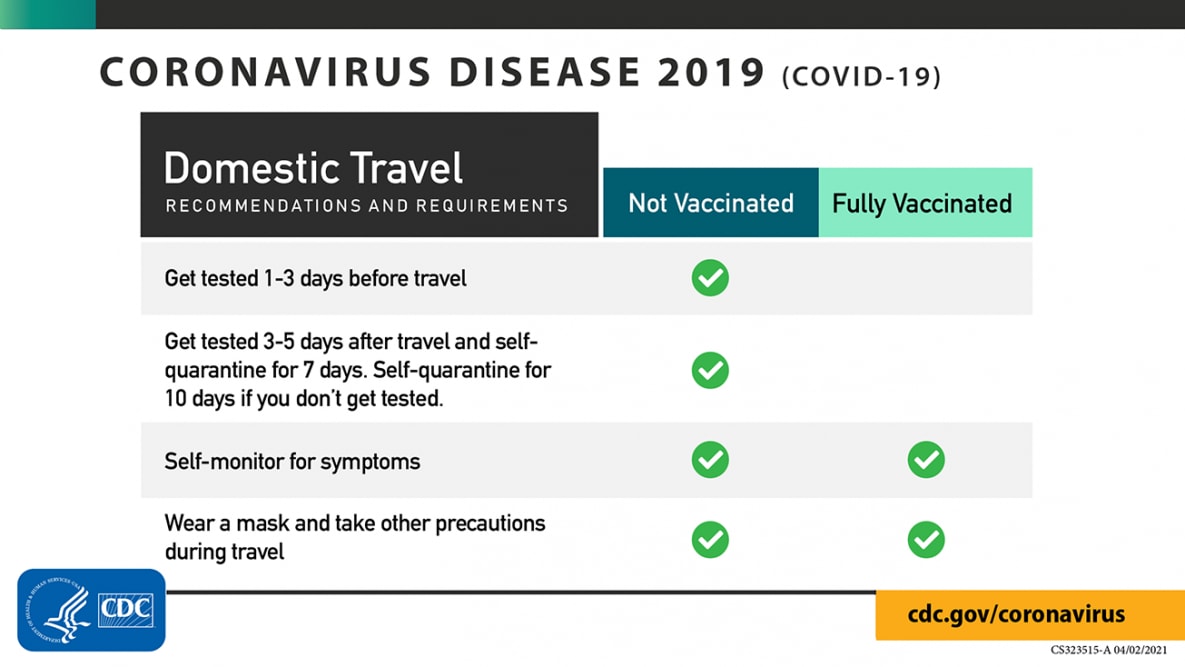People who are fully vaccinated with an FDA-authorized vaccine or a vaccine authorized for emergency use by the World Health Organization can travel safely within the United States. CDC will update these recommendations as more people are vaccinated, as rates of COVID-19 change, and as additional scientific evidence becomes available. This guidance applies to travel within the United States and U.S. territories.
Domestic Travel During COVID-19
Delay travel until you are fully vaccinated. If you are not fully vaccinated and must travel, follow CDC’s recommendations for unvaccinated people.
People who are fully vaccinated with an FDA-authorized vaccine or a vaccine authorized for emergency use by the World Health Organization can travel safely within the United States.
CDC will update these recommendations as more people are vaccinated, as rates of COVID-19 change, and as additional scientific evidence becomes available. This guidance applies to travel within the United States and U.S. territories.
Recommendations For Fully Vaccinated People
If you are fully vaccinated, take the following steps to protect others when you travel:
Have You Been Fully Vaccinated?
People are considered fully vaccinated*:
- 2 weeks after their second dose in a 2-dose series, such as the Pfizer or Moderna vaccines, or
- 2 weeks after a single-dose vaccine, such as Johnson & Johnson’s Janssen vaccine
If you don’t meet these requirements, you are NOT fully vaccinated. Keep taking all precautions until you are fully vaccinated.
If you have a condition or are taking medication that weakens your immune system, you may NOT be fully protected even if you are fully vaccinated. Talk to your healthcare provider. Even after vaccination, you may need to continue taking all precautions.
- During Travel
- Wearing a mask over your nose and mouth is required on planes, buses, trains, and other forms of public transportation traveling into, within, or out of the United States and while indoors at U.S. transportation hubs such as airports and stations. Travelers are not required to wear a mask in outdoor areas of a conveyance (like a ferry or top deck of a bus).
- Follow all state and local recommendations and requirements, including mask wearing and social distancing.
- After Travel
- Self-monitor for COVID-19 symptoms; isolate and get tested if you develop symptoms.
- Follow all state and local recommendations or requirements.
You do NOT need to get tested or self-quarantine if you are fully vaccinated or have recovered from COVID-19 in the past 3 months. You should still follow all other travel recommendations.
Recommendations For Unvaccinated People
If you are not fully vaccinated and must travel, take the following steps to protect yourself and others from COVID-19:
- Before you travel:
- Get tested with a viral test 1-3 days before your trip.
- While you are traveling:
- Wearing a mask over your nose and mouth is required on planes, buses, trains, and other forms of public transportation traveling into, within, or out of the United States and while indoors at U.S. transportation hubs such as airports and stations. Travelers are not required to wear a mask in outdoor areas of a conveyance (like on a ferry or the top deck of a bus). CDC recommends that travelers who are not fully vaccinated continue to wear a mask and maintain physical distance when traveling.
- Avoid crowds and stay at least 6 feet/2 meters (about 2 arm lengths) from anyone who is not traveling with you.
- Wash your hands often or use hand sanitizer (with at least 60% alcohol).
- After you travel:
- Get tested with a viral test 3-5 days after travel AND stay home and self-quarantine for a full 7 days after travel.
- Even if you test negative, stay home and self-quarantine for the full 7 days.
- If your test is positive, isolate yourself to protect others from getting infected.
- If you don’t get tested, stay home and self-quarantine for 10 days after travel.
- Avoid being around people who are at increased risk for severe illness for 14 days, whether you get tested or not.
- Self-monitor for COVID-19 symptoms; isolate and get tested if you develop symptoms.
- Follow all state and local recommendations or requirements.
- Get tested with a viral test 3-5 days after travel AND stay home and self-quarantine for a full 7 days after travel.
- Visit your state, territorial, tribal or localexternal icon health department’s website to look for the latest information on where to get tested.
Do NOT travel if you were exposed to COVID-19, you are sick, you test positive for COVID-19, or you are waiting for results of a COVID-19 test. Learn when it is safe for you to travel. Don’t travel with someone who is sick.
Domestic Travel Recommendations Quick Reference
alternative text for web accessible infographic

Traveling Internationally? Check CDC’s COVID-19 Travel Recommendations by Destination before planning your trip.
Check Travel Restrictions
State, local, and territorial governments may have travel restrictions in place, including testing requirements, stay-at-home orders, and quarantine requirements upon arrival. For up-to-date information and travel guidance, check the state or territorial and local health department where you are, along your route, and where you are going. Prepare to be flexible during your trip as restrictions and policies may change during your travel. Follow all state, local, and territorial travel restrictions.
If traveling by air, check if your airline requires any health information, testing, or other documents.
* This guidance applies to COVID-19 vaccines currently authorized for emergency use by the Food and Drug Administration: Pfizer-BioNTech, Moderna, and Johnson and Johnson (J&J)/Janssen COVID-19 vaccines. This guidance can also be applied to COVID-19 vaccines that have been authorized for emergency use by the World Health Organization (e.g. AstraZeneca/Oxford). See WHO’s websiteexternal icon for more information about WHO-authorized COVID-19 vaccines.

